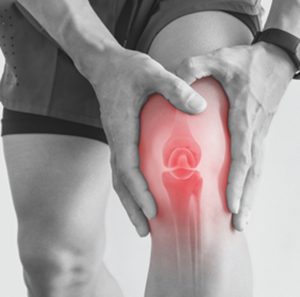 When it comes to joint replacement, one of the main conditions that orthopedic surgeons see and treat daily is knee pain.
When it comes to joint replacement, one of the main conditions that orthopedic surgeons see and treat daily is knee pain.
Arthritis is one of the primary causes of knee pain in the aging population.
Your Knees Withstand Remarkable Pressure on a Daily Basis
Walking, standing, and exercising put a lot of strain on our knees. For example, a person that weighs 150 lbs. walking up a flight of stairs will put approximately 500 lbs. of pressure on the knees — with each step. Not only is the knee one of the most intricate of all the joints in the body, but it is also the most susceptible to arthritis. Multiple types of arthritis affect the knees, but osteoarthritis is by far the number one type that surpasses all others.
Positioned between the three bones of the knee (the femur, tibia, and patella), the articular cartilage provides a smooth gliding surface and acts as a shock absorber. This cartilage is smooth and resilient but is susceptible to wear and tear. Once the cartilage begins to break down it is difficult to stop, and often, the cartilage breaks down completely and wears away. This can cause soreness, swelling, and stiffness, and is the beginning stages of osteoarthritis, or bone rubbing against bone. In turn, this can cause bone spurs and a great deal of discomfort.
Osteoarthritis develops slowly, and often, the pain becomes worse with time. This type of arthritis is also known as degenerative joint disease because it is often associated with the aging process. This process can also affect younger people. Osteoarthritis pain can be debilitating and interfere with daily activities, affect your ability to work, and create limited range of motion in your life.
Many people may find little to no relief with over-the-counter nonsteroidal anti-inflammatory drugs (NSAIDs), like ibuprofen. Other treatment methods are often necessary.
Treatment
Conservative methods are the first line of defense. These included things such as weight reduction, controlled non-resistive exercises, bracing, injections, biologic regenerative methods, and pain medication. However, because the knee joint has no blood supply, it’s difficult to heal this area with many alternative treatments, and surgery is often necessary.
Knee Joint Replacement
Depending on your individual circumstances and especially your age, you may be a candidate for a partial knee replacement. In cases of extensive degeneration, a total knee replacement may be more appropriate.
Arthritic damage to one side of the knee is common, so utilizing an implant customized for the medial or lateral deteriorated area is often a better option than a knee replacement depending on your individual circumstances.
If you are a candidate for a partial knee implant, a technique to preserve your tendons and ligaments, as well as part of your natural knee bone when possible is available. Additionally, preserving the bone will provide a more natural knee for any future treatments.
Orthopedic Associates of Southwest Florida also provides revision surgery for prosthetic joints that need to be replaced.
Joint replacement surgery is a highly effective solution to joint-related injuries and conditions. If your condition hasn’t improved with nonsurgical treatment, joint replacement surgery can help relieve your pain and improve your mobility. At Orthopedic Associates of Southwest Florida, P.A in Fort Myers, Florida, Edward R. Dupay, Jr., DO, and his team provide patient-centered, comprehensive orthopedic care and have been doing total knee replacement for 34 years.
To schedule your appointment, please call Orthopedic Associates of Southwest Florida at 239-768-2272, or ask your physician
for a referral.
Edward R. Dupay, Jr, DO
Board Certified
Dr. Dupay graduated from Xavier University in Cincinnati, Ohio. He received his Doctor of Osteopathy at the Uni-
versity of Health Sciences, College of Osteopathic Medicine in Kansas City, Missouri.
Dr. Dupay completed his Internship and Orthopedic Surgery Residency at Flint Osteopathic Hospital in Flint, Michigan. Dr. Dupay has been in the Fort Myers / Cape Coral area since 1987. Dr. Dupay enjoys seeing the “Weekend Warrior” athlete, as well as all patients suffering from crippling osteoarthritis.









